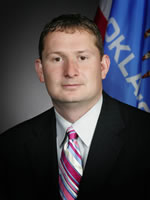In order to provide equal access and equal opportunity to people with diverse abilities, this site has been designed with accessibility in mind. Click here to view
Senator Corn Pushes Measures to Take Politics Out of Appointments/Redistricting
 Senator Kenneth Corn
Senator Kenneth Corn
State Sen. Kenneth Corn is calling on fellow members to help pass three measures aimed at removing patronage and politics in appointments and redistricting. Corn, D-Poteau, said he has introduced measures establishing specific qualifications for the appointments of tag agents and county election board secretaries, as well as a measure creating an independent commission for legislative redistricting.
“Our citizens need to know that when an appointment for a tag agent or an election board secretary is made, the most qualified person is the one who gets the job—not just the person who happens to have the best political connections. My legislation will ensure that’s exactly what happens,” said Corn. “I believe that the majority of the time, every effort is made to get the best person possible, but even then there may still be the appearance of political favoritism. That’s what we need to eliminate.”
Senate Bill 1032 would require that all county election board secretaries have three years experience in county elections and requires attendance of election board education courses provided by the State Election Board. It would also change the term for secretary from two to four years beginning in 2009.
Senate Bill 1049 would make the appointment of all tag agents in the state subject to the same procedures and requirements. Currently, tag agents from urban areas are subject to certain qualifications and requirements and to the Tax Commission’s application process.
In rural areas, tag agents are appointed by the Tax Commission without the same statutory qualifications and requirements. If approved by the Governor all prospective tag agents would be required to have the same minimum qualifications starting November 1, 2006 and would have to apply through the Tax Commission.
Senate Joint Resolution 56 calls for a vote of the people to create an independent commission on legislative redistricting. Corn said under his proposal, the Speaker of the House, the Senate President Pro Tempore and the minority leaders of both chambers would each appoint a member of the commission. No member of the Legislature who is currently in office could be appointed to the Commission. In addition, the State Ethics Commission would appoint a citizen who had been a registered independent voter for at least ten years.
“Our Constitution requires each district to have the same number of citizens and that we redraw those districts every ten years based on the latest census data. But we all know that it becomes a fight to gerrymander districts for political reasons that have nothing to do with geography or the best interest of the public,” said Corn. “Having an independent commission would ensure the citizens interests, and not those of politicians, are given top priority in the redistricting process.”
Corn said the concept has already been adopted by 12 states, including Alaska, Arizona, Arkansas, Colorado, Hawaii, Idaho, Missouri, Montana, New Jersey, Ohio, Pennsylvania and Washington. In addition, in 2005, federal legislation was introduced requiring states to conduct Congressional redistricting through an independent commission and prohibiting more than one Congressional redistricting following a decennial census.
“It seems every time we redistrict, the political infighting and the possibility of having to resolve these plans in court just escalates. By letting the public vote on establishing an independent redistricting commission, we can improve the process and assure the public that the district lines will be drawn in the fairest way possible.”
 Oklahoma Senate
Oklahoma Senate

